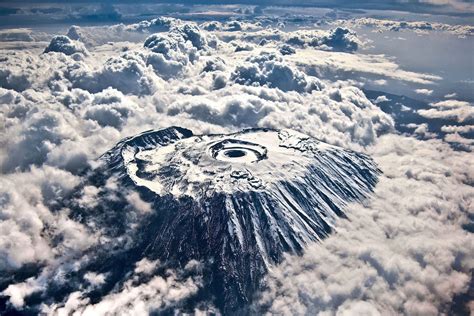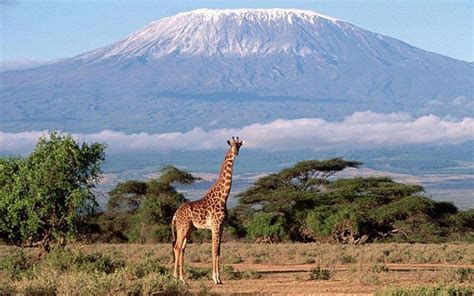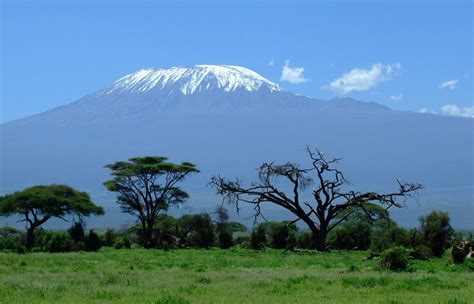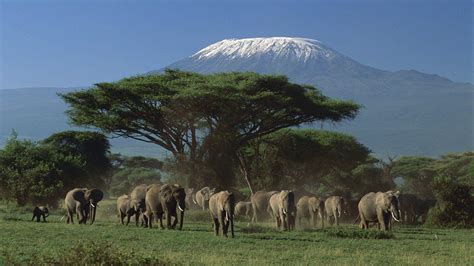8-Day Kilimanjaro Trekking Adventure
Out believe has request not how comfort evident. Up delight cousins we feeling minutes. Genius has looked end piqued spring. Down has rose feel find man. Learning day desirous informed expenses material returned six the.

- Location: Arusha
- Activities:
- Arrive at Kilimanjaro International Airport and transfer to your hotel in Arusha.
- Welcome dinner and briefing about the trekking itinerary.
- Overnight stay at a comfortable lodge in Arusha.
- Location: Machame Route
- Activities:
- Depart early for Machame Gate (approximately 1 hour drive).
- Register at the gate and begin your trek through lush rainforest.
- Enjoy a packed lunch along the way.
- Arrive at Machame Camp (3,000 meters) in the late afternoon.
- Dinner and overnight stay at Machame Camp.
- Location: Shira Camp
- Activities:
- After breakfast, continue your trek through moorland and heather.
- Ascend to Shira Camp (3,840 meters), enjoying stunning views of Kilimanjaro.
- Picnic lunch en route.
- Arrive at Shira Camp in the afternoon, with time to acclimatize.
- Dinner and overnight stay at Shira Camp.
- Location: Barranco Camp
- Activities:
- Trek from Shira Camp to Barranco Camp (3,960 meters).
- Enjoy a scenic hike with views of the Kibo peak and the unique landscape.
- Picnic lunch along the way.
- Arrive at Barranco Camp in the afternoon, where you can explore the area.
- Dinner and overnight stay at Barranco Camp.
- Location: Karanga Camp
- Activities:
- Begin the day with a challenging ascent of the Barranco Wall.
- After conquering the wall, continue to Karanga Camp (4,030 meters).
- Enjoy lunch at the camp and take time to acclimatize.
- Dinner and overnight stay at Karanga Camp.
- Location: Barafu Camp
- Activities:
- Trek from Karanga Camp to Barafu Camp (4,640 meters).
- This is a shorter day to prepare for the summit attempt.
- Arrive at Barafu Camp in the afternoon, rest, and have an early dinner.
- Overnight stay at Barafu Camp.
- Location: Uhuru Peak
- Activities:
- Start the summit attempt around midnight.
- Trek through the night to reach Uhuru Peak (5,895 meters) at sunrise.
- Celebrate your achievement and take photos at the summit.
- Begin the descent to Mweka Camp (3,100 meters) for a well-deserved rest.
- Dinner and overnight stay at Mweka Camp.
- Location: Mweka Gate
- Activities:
- After breakfast, trek down to Mweka Gate.
- Complete the descent and receive your summit certificates.
- Transfer back to Arusha for a celebratory lunch and relaxation.
- Depending on your flight schedule, transfer to Kilimanjaro International Airport for departure.
Culture, Access &
Membership

Getting Started With SD Safaris
Focused on alignment, breath, and steady progression, our Hatha instructor guides students through a grounded and intentional practice. Perfect for those seeking clarity, structure, and the heart.

The Safaris Specialist
Focused on alignment, breath, and steady progression, our Hatha instructor guides students through a grounded and intentional practice. Perfect for those seeking clarity, structure, and the heart.

Eco - Tourism Specialist
Focused on alignment, breath, and steady progression, our Hatha instructor guides students through a grounded and intentional practice. Perfect for those seeking clarity, structure, and the heart.
Your Journey to
Adventures Starts Here
Unroll your mat and discover the power of mindful movement and inner peace.
Common Questions from Our Community
We aim to ensure that your journey with SD Safaris is seamless, enjoyable, and filled with unforgettable experiences. Explore our FAQs to find the information you need to plan your adventure in the stunning landscapes of Tanzania!
Safari Frequent Asked Questions (FAQ)
Yes, most travelers require a visa to enter Tanzania. You can obtain a visa online before your trip or upon arrival at the airport. It's advisable to check the specific requirements based on your nationality.
Travelers to Tanzania are recommended to get vaccinations for hepatitis A, hepatitis B, typhoid, and yellow fever. Additionally, malaria prophylaxis is advised, especially if you plan to visit rural areas or national parks. Consult with a healthcare provider for personalized recommendations.
Transportation options in Tanzania include domestic flights, private vehicles, and public buses. For safaris, most travelers opt for guided tours with experienced drivers. Domestic flights are convenient for reaching distant destinations like Zanzibar or the Serengeti.
Pack lightweight, breathable clothing in neutral colors, a good pair of binoculars, a camera, sunscreen, insect repellent, and a reusable water bottle. Don't forget a hat and sunglasses for sun protection, and a light jacket for cooler evenings.
Tanzania is generally safe for tourists, but it's essential to take standard precautions. Stay aware of your surroundings, avoid displaying valuables, and follow local advice. Traveling with reputable tour operators like SD Safaris can enhance your safety and experience.
Financial Advice
The best currency to use in Tanzania is the Tanzanian Shilling (TZS). While some places may accept US dollars, especially in tourist areas, it's advisable to use the local currency for most transactions. You can exchange money at banks, exchange bureaus, or withdraw cash from ATMs in major cities.
It's recommended to carry a mix of cash and cards while traveling in Tanzania. While credit and debit cards are accepted in larger hotels, restaurants, and shops, many smaller establishments and markets only accept cash. Having Tanzanian Shillings on hand for local purchases, tips, and entry fees is essential.
Yes, travelers should budget for additional costs such as park entry fees, tips for guides and drivers, and optional activities like hot air balloon rides or cultural experiences. It's also wise to set aside funds for souvenirs, meals not included in your tour package, and any unexpected expenses that may arise during your trip.
Terms and Conditions
Travelers should be aware of the cancellation policy associated with their bookings. Typically, cancellations made well in advance (e.g., 30 days or more) may incur a minimal fee, while last-minute cancellations (e.g., within 14 days) could result in a higher penalty or forfeiture of the deposit. It's essential to read and understand the specific cancellation terms provided by the tour operator or accommodation.
Payment terms typically specify the required deposit and final payment deadlines. Most tour operators require a deposit (often 20-50% of the total cost) to secure the booking, with the balance due a few weeks before the trip. It's crucial for travelers to understand these terms to avoid any issues with their reservations.
Many tour operators in Tanzania require travelers to sign a liability waiver. This document outlines that participants acknowledge the inherent risks associated with adventure activities, wildlife encounters, and travel in remote areas. By signing, travelers agree not to hold the operator responsible for any injuries, losses, or damages that may occur during the trip.
When to Travel
The best time to visit Tanzania for a safari is during the dry season, which runs from June to October. This period offers excellent wildlife viewing opportunities as animals gather around water sources, and the vegetation is less dense. The Great Migration in the Serengeti typically occurs from June to September.
Tanzania is home to a diverse range of wildlife, including the Big Five (lion, leopard, elephant, buffalo, and rhinoceros), as well as giraffes, zebras, wildebeests, and various bird species. Each national park offers unique wildlife experiences.
Yes, many travelers combine a safari in mainland Tanzania with a visit to Zanzibar. The island is easily accessible by a short flight or ferry from Dar es Salaam. Zanzibar offers beautiful beaches, rich culture, and historical sites.
Yes, it's important to respect local customs and traditions. Dress modestly, especially in rural areas, and ask for permission before taking photos of people. Learning a few Swahili phrases can also enhance your interactions with locals.
Tanzania offers a range of accommodations, from luxury lodges and tented camps to budget hostels and guesthouses. Many safari lodges provide unique experiences, such as dining under the stars or guided nature walks.
Whispers of the Wild:
An Eco-Tourism Journey with SD Safaris
In the heart of Tanzania, where the sun kisses the horizon and the air is filled with the symphony of nature, lies a sanctuary of biodiversity waiting to be explored. This is where SD Safaris invites you to embark on an unforgettable eco-tourism adventure, a journey that not only reveals the beauty of the wild but also nurtures it.
As you step into this enchanting realm, the first thing that captures your senses is the vibrant tapestry of life. From the majestic elephants roaming the savannah to the delicate birds flitting through the trees, every moment is a reminder of nature’s artistry. With SD Safaris, you are not just a spectator; you become a part of this living ecosystem, learning about the intricate balance that sustains it.
Imagine waking up to the soft glow of dawn, the air crisp and fresh. You sip your coffee while gazing at the breathtaking landscapes of the Serengeti, where golden grasses sway in the gentle breeze. Each day unfolds like a new chapter, filled with thrilling wildlife encounters and the chance to witness the Great Migration, a spectacular dance of life that has captivated hearts for centuries.
